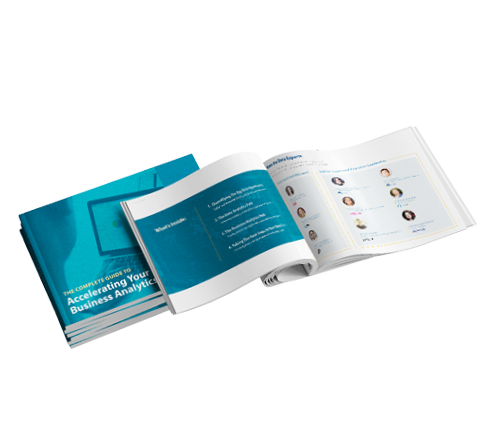Request Information
We're Sorry
There was an unexpected error with the form (your web browser was unable to retrieve some required data from our servers). This kind of error may occur if you have temporarily lost your internet connection. If you're able to verify that your internet connection is stable and the error persists, the Franklin University Help Desk is available to assist you at helpdesk@franklin.edu, 614.947.6682 (local), or 1.866.435.7006 (toll free).
Just a moment while we process your submission.

Is a Master’s In Data Analytics Worth It?
From Big Data to real-time data, qualitative to quantitative, the amount of data being generated is exponential—and at our fingertips like never before. But what do we do with all of this information? Turning data into impactful insights has the power to revolutionize industries, grow businesses, and change the experiences of individuals.
This massive undertaking is precisely the role of data analytics professionals. They act as the conduit between raw data and innovative solutions. By collecting, organizing, and structuring data, they maintain its integrity and ensure its usefulness. By analyzing, visualizing and synthesizing data, these professionals help determine the strategic direction of businesses.
Due to their integral role and the advanced analytical skills needed to succeed, demand for data scientists far outpaces the supply. Is a master’s degree in data analytics really what you need to succeed? Here’s the answer.
The Importance of Data Analytics Today & Tomorrow

Every industry today is being transformed by the power of data. Whether an organization is looking to improve profitability, gain new customers, better serve their constituencies or get an edge over their competition—they turn to data for the solution.
Here’s how data analytics professionals are shaping some of the most important industries around the world.
- Healthcare is using data and analytics to identify and treat diseases, improve patients’ quality of life and avoid preventable deaths. The spread of COVID-19 into a worldwide pandemic is a perfect example of the need for accurate data to slow and prevent the spread of a virus.
- Financial Services and Insurance companies use data and analytics to prevent fraud, identify outperforming stocks and even provide discounts to safe drivers. Data will continue to shape how these institutions function, further tailoring their service offerings to the needs of consumers and businesses.
- Manufacturing is using data to not only improve their processes, but also their products. Manufacturers are investing in smart facilities and embedding sensors to collect data to ensure their equipment functions properly at every stage of the product’s lifecycle.
- Retail companies use data to identify trends, predict purchasing behaviors and adapt manufacturing to meet the needs of consumers. Both online and offline, data-driven retail businesses are more likely to understand their customers and turn them into loyal buyers.
- Agriculture, a very traditional industry, is even experiencing a transformation thanks to data. Farmers are benefiting from crowd-sourced, real-time data collected by their farming equipment and thousands of other farmers—helping them better manage their land.
But good data, analytics and insights aren’t easy to come by. That’s where highly-skilled data analytics professionals come in.
5 Qualities of a Successful Data Scientist
Becoming a data scientist requires a unique combination of analytical prowess and creative problem solving, as well as detail orientation and big picture thinking.
In their everyday job, a successful data scientist must:
- Be able to work independently on the full scope of a data analytics project—from identification and collection through modeling and visualization.
- Possess advanced technology skills and knowledge, including: coding in versatile languages like Python, database management, Big Data processing and machine learning.
- Have strong business acumen and communication skills to disseminate findings to stakeholders and impart actionable insights that will improve how the business operates.
- Thrive in cross-functional collaboration situations and work effectively with different departments—from IT and marketing to executive management.
- Be intellectually curious and enjoy continuously improving methods of data collection, analysis and visualization as business challenges and technology evolve.
Gaining the hard and soft skills to become a top data analytics professional is not an easy task. It takes years of practical experience, as well as advanced levels of education.
Get a FREE roadmap that includes insider information to help you maximize the many opportunities in the fast-growing field of Big Data.
6 Reasons You Need an M.S. in Data Analytics
You may be thinking that you have many of the qualities of a good data scientist. So why do you need the master’s degree?
Here are the leading reasons why it’s beneficial to get your master’s degree in data analytics.
- The majority of the data analytics professionals hold advanced degrees. According to Burtch Works, a leading executive recruitment firm, 91% of data scientists have a master’s degree or Ph.D. For many careers in this field, a master’s degree is either the minimum or preferred education for candidates.
- Keep up with the growing demand for cutting-edge skills. Even if you have fundamental math and technology skills, the tools of this trade are constantly changing. You need to be able to code in Python, address Big Data using Apache Spark, and visualize data using Tableau. A master’s degree is a great way to gain all of these skills in one seamless program.
- Stay up to date with the latest industry trends. Machine learning, artificial intelligence, the Internet of Things and cybersecurity are all presenting new challenges and opportunities in the field of data analytics. Finding the right master’s degree can help you understand these realities and their implications for the future of data science.
- Gain superior decision making abilities. Data doesn’t always tell a clear picture and often, there isn’t one right answer. Being able to use data to understand your options, their inherent risks, and determine the best path forward is the true sign of a leader in data analytics. A master’s degree in data analytics will help prepare you to make these pivotal decisions.
- Earn or qualify for industry certificates and credentials. The more credentials you have, the easier it is to showcase your expertise to potential employers. A master’s degree shows your dedication to the field and your desire to be a lifelong learner. The best master’s degree programs will also prepare you to gain (or even grant you) professional certifications, like SAS and Tableau, making the degree worth even more to your career.
- Be prepared to drive change (not just adapt to it). By gaining a master’s degree in data analytics, you can help lead change in your organization. You will not only have the tools you need, you will be able to create new methods and best practices for gathering, cleaning, analyzing and visualizing data at your organization.
Why a Data Analytics Degree is Worth the Investment
The number one reason a master’s degree in data analytics is worth it? The career opportunities. Data scientist and similar data professions are consistently ranked as top careers in the United States.
Data scientists score high on job satisfaction marks—due to a combination of a stimulating work environment, results-driven problem solving and the tangible impact of their work. They also command high salaries. According to labor market analytics firm, EMSI, the average posted salary for a data scientist is $120,200. Due to current high demand and long-term growth projection, job stability for this career will also remain high.

If becoming a data analytics professional sounds like the career for you, the next step is finding the right master’s degree program to help you reach your full potential.
Find the Best Master’s Degree in Data Analytics
Data analytics is a relatively new degree. In the past, many data professionals had degrees in computer science, statistics or other related fields. To find the best master’s in data analytics program, you need to know what to look for.
If you’re a working professional, a flexible, fully online master’s in data analytics program can allow you to earn your degree on your schedule. Look for a degree that will also help you complete your degree quickly and affordably. You also need a program that focuses on real-world skill building and will prepare you for a long, rewarding career in data analytics.
Franklin University offers a fully online M.S. in Data Analytics that can be completed in as few as 19 months. You’ll learn hands-on skills using industry-leading tools, programming and modeling techniques. Not only will you earn your master’s degree, you will also become SAS certified in data analytics—just one more way to set yourself apart.
Explore the details of our Master’s Degree in Data Analytics to see how it can help you advance your career in this thriving profession.





